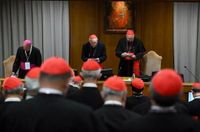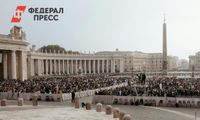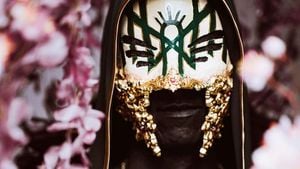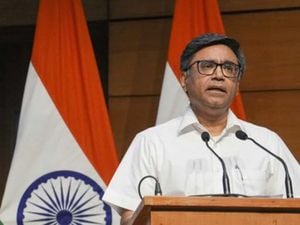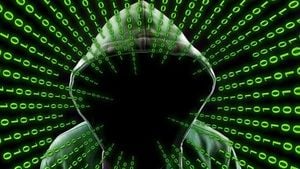On May 7, 2025, the Vatican is set to commence a conclave—a special assembly of cardinals from the Roman Catholic Church tasked with electing a new Pope. This event marks a significant moment in the Church's history as it seeks to find a successor to the late Pope Francis, who served as the 266th pontiff.
A total of 133 cardinals, who have gathered from around the globe, will participate in this conclave. Although there are over 250 cardinals in the Roman Catholic Church, only those under the age of 80 are eligible to vote. This limitation is in place to ensure that the voting body consists of those deemed capable of fulfilling the responsibilities of selecting a new leader for the Church.
To be elected, the new pontiff must secure at least two-thirds of the votes cast during a series of secret ballots. There are no age restrictions for the position of Pope; any Catholic man can be elected. However, it is customary for the head of the Holy See to be chosen from among the cardinals.
On the day of the conclave, all cardinal-electors will be locked inside the Sistine Chapel, the iconic papal chapel located in the Apostolic Palace. Before entering, they will take an oath on the Gospel to maintain the secrecy of the proceedings. The cardinals will enter the chapel while the hymn "Veni Creator Spiritus" is played, after which the doors will be locked from the inside, initiating a period of isolation that will last until a new Pope is elected, regardless of how long that may take.
This isolation is designed to prevent any external influences or pressures from impacting the decision-making process. Once inside, the cardinals will engage in a secret ballot, where they will write the name of their chosen candidate, disguising their handwriting to ensure anonymity. Voting will continue until one candidate achieves the requisite two-thirds majority.
If, after a vote count, a candidate receives the necessary support and agrees to accept the papacy, the ballots will be burned for the final time, resulting in white smoke rising from the chapel's chimney—a signal to the world that a new Pope has been elected. A special smokestack was installed on the chapel roof on May 2, 2025, to facilitate this tradition, with two cast-iron stoves located 30 meters below to ensure the smoke's color is clear. Vatican specialists use distinct combinations of chemical compounds to create the black and white smoke signals.
Once elected, the new pontiff will choose a name for his papacy and don the traditional white papal vestments in the Room of Tears, where he will change from the red robes of a cardinal. Subsequently, the oldest cardinal-deacon will announce the result of the conclave from the balcony of St. Peter's Basilica, and the new Pope will deliver his first address to the public.
This conclave on May 7 will mark the 26th occasion that the Sistine Chapel has hosted such an event, as noted by the Vatican press office. It will also be the 76th conclave conducted under the established rules set by Pope Gregory X in 1274. Gregory X's own election took an unprecedented two years and two months, leading him to implement the isolation requirement for cardinals during voting to mitigate external influences.
Historically, conclaves have varied in duration. The fastest conclave occurred in 1503 when Pope Julius II was elected in just a few hours. In contrast, Pope Francis was elected relatively swiftly on March 13, 2013, after only five rounds of voting over the course of less than two days.
As the conclave approaches, speculation regarding potential papal candidates is growing. While there is no clear frontrunner, several names have emerged as likely contenders, according to reports from the New York Times. Among them is Anders Arborelius, the Archbishop of Stockholm, who is noted for advocating for greater female influence within the Church and aims to bridge divides in a polarized world.
Another prominent candidate is Peter Erdő, the Archbishop of Esztergom-Budapest, known for his expertise in canon law and his conservative stance, aligning with the policies of former Popes John Paul II and Benedict XVI. Erdő's diplomatic skills have garnered respect, especially for his efforts to foster connections among Catholics across continents.
Matteo Zuppi, the Archbishop of Bologna, is also a contender, recognized for his alignment with Pope Francis’s mission of aiding the poor and his support for the Catholic LGBT community. Rumors suggest that Pope Francis may have considered Zuppi as a potential successor, although this remains unconfirmed.
Additionally, Luis Antonio Tagle, a curial cardinal from the Philippines, is viewed as a liberal preacher and has been dubbed the "Asian Francis." His candidacy could mark the first time a Pope hails from Southeast Asia. Tagle is known for his emphasis on the Church's role in the developing world and has been involved in significant discussions within the Church, including issues surrounding communion for divorced Catholics.
Friedolin Amboango, the Archbishop of Kinshasa in the Democratic Republic of Congo, is another candidate closely aligned with Pope Francis. He is among the nine members of the Council of Cardinals but has expressed opposition to the previous Pope's endorsement of blessings for same-sex couples. Amboango could potentially become the first Black Pope.
Pietro Parolin, the Vatican’s Secretary of State, is considered a strong candidate as well, with expectations of receiving support from around 50 electors. He has played a pivotal role in shaping the Holy See's foreign policy throughout Pope Francis's papacy and is recognized for his understanding of the sentiments within the Curia.
Finally, Pierbattista Pizzaballa, the Latin Patriarch of Jerusalem, is viewed as a favorite alongside Parolin. His experience in the Middle East may be advantageous, although he has spent considerable time away from the Vatican. At 60 years old, he is the youngest candidate for the papacy.
As the world watches closely, the conclave of May 7, 2025, is poised to be a defining moment for the Roman Catholic Church, shaping its future leadership and direction.
